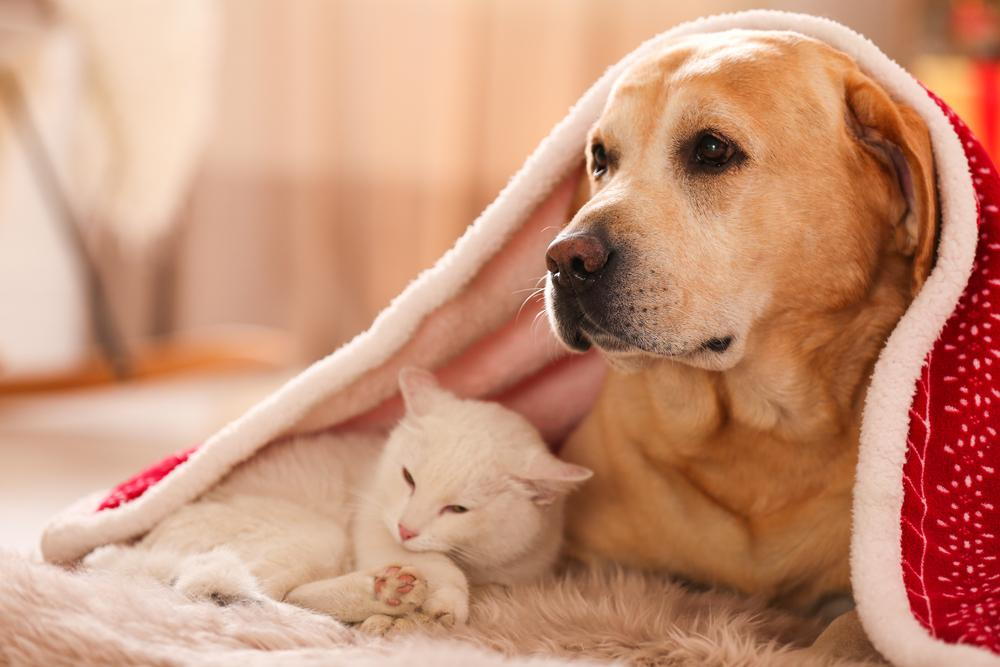
Winter always brings dry, chilly air that makes our skin dry and itchy. Our dogs and cats suffer from the same winter dry, flaking skin and itchiness issues that we do. In addition, the dry weather can cause their throat and eyes to get dry and even cause their paws to chap. To keep your pet healthy throughout the winter season here are some easy to follow useful tips:
Keep those paws dry:
When you walk your dog outside its paws get wet. When you get in, dry the paws with a soft cloth. If it’s been snowing, check between foot pads to remove traces of snow or ice, salt, and chemicals. The cold may cause the area between the toes may get red and you may find cracks there. Use a coconut oil massage to get rid of the cracks and the redness. Coconut oil has a very calming effect on your pet’s skin. At the vets, you can also find paw protectants, or you may want to buy some booties. It may take some time for the pet to get used to them, but they work great.
No more frequent baths:
The safest temperatures for your pets are between 50-60 degrees. From November to February avoid washing your pets often. If you have a swimming pool, keep the dogs away from it. Like us humans, dogs and cats also have protective oils on their skin which prevents dryness and flaky skin. When the pet begins to stink a bit, it is good to ask a vet to suggest a good moisturizing shampoo and cream. If you like to shave the dog down to its skin, wait for summers. In winters a long coat helps the pet fight the cold and dryness. Those with long-haired dogs can trim it enough to keep it tidy. Dogs that have a short coat will like a sweater that covers them well for protection against the cold outside.
Increase or decrease their dietary portions:
There are two kinds of pets, those that stay indoors and those who live outdoors. If you have outdoor pets, do ensure they have good water to drink that is not very cold. Increase their diet as they burn more calories to fight the winter cold. Pets that stay indoors will have less food in winters as there will be less outings. In both cases do ensure your pet is well hydrated. Indoor pets have a tendency to put on weight in winter and a cut in food intake will help them stay fit. Do take them out for walks on the warmer sunny afternoons whenever possible.
Consider a warm environment:
If it is below 45 degrees Fahrenheit outside bring the pets in or make a shelter outdoors to keep them warm. Your pets will appreciate a warm area with a cozy bed to sleep in. Do buy a blanket for your pet to keep it warm at night. Whenever you feel the outdoors is getting extremely cold even for you to step out in, it’s time to bring your furry friends inside. Use a closet or a separate area of the house to shelter them from hypothermia. Cold pets may suffer from disorientation and can wander out to never find their way back home. In many areas, there are laws in place in favor of pets as they can get ill or die in the cold. If you like to carry your dogs in the car when going out, do not leave them alone in it. Cars can get very cold, quickly when the temperature dips below freezing, and as a result, your pet can develop hypothermia. Symptoms include shivering, lethargy, stiff muscles, pale or gray gums, lack of coordination, dilated pupils, and low heart rates. Pets can also collapse and suffer from a coma. For smaller dogs, elderly dogs and dogs with health conditions; 32 degrees Fahrenheit is very cold so bring them in when temperatures get that cold. If your dog must stay outside, protect it from the elements by making an insulated doghouse with carpeting on a raised surface. It needs to be small enough to retain body heat while being big enough for it to stand up, lie down, and turn around without a hassle.
Use pet-friendly coolants and anti-freeze
Coolants and antifreeze with ethylene glycol are poison for pets and they can die easily when exposed to them. Ethylene glycol is sweet tasting and pets get drawn to it and may consume it. Just a small amount can cause permanent and fatal damage to kidneys. If you spill any by accident or it spills from the car make sure you clean it up. A good alternative to these coolants and anti-freeze is the propylene glycol coolants and anti-freeze that are pet friendly.
The above tips will help your pet stay comfortable and healthy throughout the winter season. Remember, your pet’s are part of the family so take good care of them this winter. Happy Holidays!
